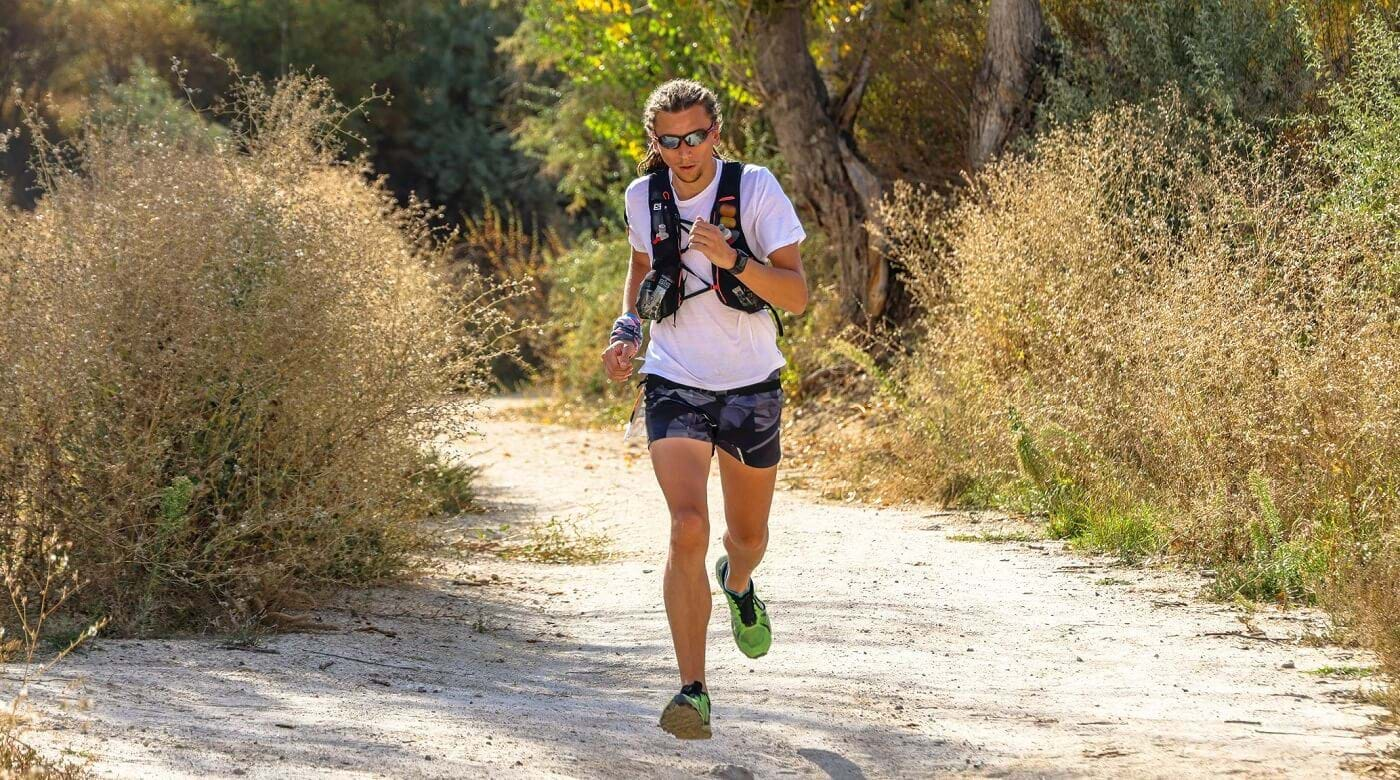How To Train For Your First Ultramarathon

What Is An Ultramarathon | How Long To Train | Training Tips | Strength Training | Nutrition | What To Bring
If you're a seasoned marathon or long-distance runner looking for a new challenge, you might be considering running an ultramarathon. In this blog, PureGym PT and long distance runner Zach Kingsbury looks at everything you need to know about ultramarathon training.
What Is An Ultramarathon?
An ultramarathon does not have a set distance - it refers to any race longer than a marathon (26.2 miles or 42.2km), with competitions typically starting at 50km. This includes single day races to multi day races that can be hundreds of kilometres. Common ultramarathon distances include 50km, 50 miles, 100km, and 100 miles.
Ultramarathons tend to run across varying and challenging terrains, rather than on roads, so are usually more challenging than marathons even when accounting for the distance.
How Long To Train For An Ultramarathon
Training for an ultramarathon will look different depending on your past marathon and running experience, as well as the distance of your ultramarathon race. For a complete training block, aim for a year of consistent training to allow for injuries, plateaus, and interruptions. Complete beginners should factor longer, setting smaller goals along the way.
If you’re a seasoned long distance or marathon runner, 16-24 weeks can of ultramarathon training should be fine. Your training will look similar to marathon training but with longer distances.
How Often Should You Run Each Week?
You should aim to run at least 4-5 times each week when training for an ultramarathon, but just 1-2 of these need to be long runs. For most people, doing multiple shorter runs (7-10km) throughout the week followed by longer runs (up to 30km) on the weekend works well, however it’s important to listen to your body and adjust each run based on how you feel.
How To Train For An Ultramarathon
When creating your ultramarathon training plan, these ultramarathon training tips will help:
Build your distance gradually
The key to running any race safely is building your distance gradually as this allows the muscles and tendons to adapt to the load with a smaller risk of injury. This includes the total distance run over a full week, and the distance of your longest run. Around 5-10% increase each week is considered safe.
Do back to back long runs
For most people, running ultramarathon distances in the lead up to the event is not realistic. One way to work around this is to do two long runs back to back on consecutive days. This helps to condition your body and mind to run when your legs are fatigued, and is particularly helpful as part of a multi day ultramarathon training plan.
Practice on different terrains
Ultramarathons are carried out on multiple terrains, so it’s helpful to practice running on different surfaces and environments. This includes running up and down hills to, to help prepare your muscles to deal with the different contractions and efforts involved in both.
Cross train
Cross training is a great way to condition your body and mind without overdoing it on the running. Include a variety of other aerobic exercises throughout the week, along with stretching and mobility work, and strength exercises. Strength and mobility work in particular can help to prevent training injuries by improving your body’s ability to handle the impact it is put under when running.
Train for time
The different terrains ultramarathons have mean that your running pace can be a lot slower than your usual race pace. Training around total time run rather than distance can be a good way to ensure you are conditioned for the total race duration.
Include rest days
It can be tempting to work out every day to fit in your runs and cross training workouts but getting rest is crucial in avoiding injuries and plateaus. At least one full rest day a week will help your body to recover, so that your muscles and ligaments can repair, and your nervous system can settle.
Ultramarathon & Strength Training
Having an ultramarathon strength training plan is an important part of any ultramarathon training. Running strengthens the leg muscles and cardio system, but adding strength training helps to build more leg strength and power and build stronger joints and ligaments. Strength training can help to reduce the pressure placed on joints during running, improve stride pattern and running technique, reduce risk of ankles and knees giving way while running, reduce overall risk of injury, and improve running endurance.
Some tips to consider when strength training during your ultramarathon training:
Avoid lower body workouts the day before, of, or after your long runs, to avoid fatigue and underperformance.
Include a mix of heavy and moderate weights, as well as isometric and eccentric exercises. This will help you to build strength and endurance in both the muscles and tendons.
Train all muscle groups. It can be tempting to just work the legs, but training all muscle groups will help to avoid muscular imbalances and prevent injuries.
A good aim is 1-2 full body sessions a week while training for your ultramarathon. This is enough to build strength and resilience without putting too much additional demand on your body.
Ultramarathon Strength Training Workout
This is a lower body focused workout that will help to strengthen all the muscle groups used in running.
Warm up
- 5-10 minutes of dynamic movements such as lunges, leg swings, and jumping jacks.
Workout
- Squats (3 sets of 10-12 reps)
Aim for 70% max effort. Don't overload the bar. Focus on depth to improve mobility.
- Deadlifts (3 sets of 10-12 reps)
Aim for 70% max effort. Don't overload the bar. Focus on mobility and technique.
- Leg extensions (3 sets of 10-12 reps)
Aim for 75% max effort. Focus on slow tempo, keeping muscle under tension throughout
- Sled push (3 sets of 10-12 reps)
Bodyweight sled, focus purely on leg power so close grip and drive through quads.
- Back extension (3 sets of 10-12 reps)
Bodyweight. Focus on depth and range of motion.
- Calf press (3 sets of 10-12 reps)
50% max effort. Focus on feeling stretch through both top and bottom of movement.
Cool down
- Finish with stretch programme (below)
Stretching & Mobility
Another important component of your ultramarathon training is flexibility and mobility work. Working on your mobility will help to prevent injuries and can improve stiffness and pain. Warm up with dynamic stretches and aim for at least 10-15 minutes of passive stretches and foam rolling after every run and strength training session:
Stretch programme
Hold each stretch 15-20 seconds.
Standing quad stretch
Lying hamstring stretch
Hip flexor stretch
Lying lower back stretch
Standing calf stretch
Foam rolling
Roll entire muscle 4-5 times each side.
Calf
Quad
Hamstring
Nutrition For Ultramarathon Training
During your ultramarathon training, your nutrition strategy should focus on fuelling your body with enough energy for your runs and for recovery after. Aim for at least three meals a day, with carb heavy meals daily. On long run days, you should have carb heavy breakfasts to fuel up.
Calories
You’ll be burning a lot of calories while training for an ultramarathon, and it’s important to eat enough calories to fuel both your daily energy requirements and your runs. Undereating makes it harder for your body to fuel your runs and can be detrimental to your ultramarathon training.
Carbohydrates
Carbohydrates are crucial for building up your body’s energy stores before your runs and replenishing them afterwards. Prioritise complex, fibre rich carbs in your meals as these have more vitamins and minerals but eat simple carbs 1-2 hours before your runs.
Protein
Protein is used by the body to help repair and rebuild muscle tissue and is an important part of recovery. Aim to eat plenty of protein with all your meals, but avoid large amounts of protein in the 1-3 hours lead up to a run as they can take longer to digest.
Fats
Fats are essential for many body functions and help to keep the cells and nervous systems healthy. Having small amounts of fat in your meals and snacks helps with overall energy and health, and can also help with satiety. However, avoid eating fat before your runs as it is slower to digest.
Hydration
Hydration is a key aspect of ultramarathon training. It’s important to drink plenty of fluids consistently each day – aim for around 2-3l. Make sure you are hydrated before you set off on any of your runs, and that you replenish with water during and after your runs to replace fluids lost through sweating. On longer runs, you may want to add some electrolytes to your water or drink sports drinks to help rehydrate efficiently.
Eating during your runs
On longer runs over 60 minutes, you’ll likely need to fuel during the run itself. Your training is the perfect time to experiment with what kinds of food or drinks you can consume while running. Some people cope well with solid foods, while others can only stomach running gels or energy drinks. Find what works for you and stick with that during the race.
Ultramarathon Preparation Tips
An important part of ultramarathon preparation is preparing what to bring on race day. The exact list can vary depending on the total distance and whether you’re running a multi event race, but this list should help as a guide:
Clothing
During an ultramarathon, you’re likely to be exposed to multiple weather conditions, especially if running at night or early morning. Wear layers that can be easily removed or added on, including an insulation layer, and pack a light raincoat, gloves, and hat. You may also want to bring extra pairs of socks, shoes, and an additional running top.
First aid
Running for ultra long distances can be hazardous, and it’s best to bring some first aid essentials to help protect and prevent against issues. Bring sun cream and anti-chafing cream and make sure to regularly apply these throughout the day. Basic first aid kit, such as plasters, sanitizer, hand wipes, emergency blanket, and painkillers, can be handy to have in case you have an accident.
Fuel
If you’re running an ultramarathon event, it’s likely they’ll be fuel and water provided at the aid stations, however we’d recommend you still pack plenty of your favourite running fuel to bring with you in case your preferred fuel isn’t available. You’ll also want to bring water and electrolytes to keep you hydrated.
Other
Some other items you might want to bring include:
Headphones
A portable charger and cables for your phone as well as any other electronics
A headlamp if running over darker hours
Waterproof gaiters to keep your feet dry and stone free
Trekking poles


